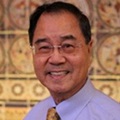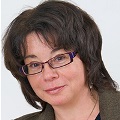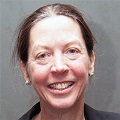All times are Eastern Daylight (EDT). Determine your correct time for streaming events here.
Enter Pittsburgh, PA (USA) to see the Eastern Time Zone.
Click each speakers' name to read their biography.
- Kang L. Wang, University of California, Los Angeles
Monday, July 13 | 11:05 am ET
- Thomas H. Epps, III, University of Delaware
Tuesday, July 14 | 11:10 am ET
- Linda Nazar, University of Waterloo
Wednesday, July 15 | 12:00 pm ET
- Karin M. Rabe, Rutgers University
Thursday, July 16 | 12:00 pm ET

Monday, July 13 | 11:05 am ET
Kang Lung Wang, University of California, Los Angeles
Kang L. Wang is currently Distinguished Professor and the Raytheon Chair Professor in Physical Science and Electronics at the University of California, Los Angeles (UCLA). He is affiliated with the departments of electrical and computer engineering (ECE), materials science and engineering (MSE) and physics/astronomy. Wang received his MS and PhD degrees from the Massachusetts Institute of Technology and his BS degree from National Cheng Kung University, Taiwan. He is a Guggenheim Fellow, Fellow of the American Physical Society (APS) and IEEE, and a Laureate of Industrial Technology Research Institute of Taiwan. He is also an Academician of Academia Sinica. His awards include the IUPAP Magnetism Award and Néel Medal, the IEEE J.J. Ebers Award for electron devices, SRC Technical Excellence Award, the Pan Wen-Yuan Award, Chinese American History Makers Lifetime Achievement Award, and others. He has served as the Editor-in-Chief of IEEE Transactions on Nanotechnology (TNANO), editor for Artech House, and editor for J of Spins and for Science Advances, as well as other publications. His research areas include topological insulators—materials and physics; quantum information and computing; spintronics and nonvolatile electronics, and nanoscale physics and materials; molecular beam epitaxy.

Tuesday, July 14 | 11:10 am ET
Thomas H. Epps III, University of Delaware
Thomas H. Epps is the Thomas and Kipp Gutshall Professor of Chemical and Biomolecular Engineering at the University of Delaware with a joint appointment in materials science and engineering and an affiliated appointment in biomedical engineering. He is also the director of the new Center for Research in Soft Matter and Polymers (CRiSP). He joined the University of Delaware in 2006 after a stint as a National Research Council Postdoctoral Fellow at the National Institute of Standards and Technology.
Epps’ research interests include nanostructured assemblies for targeted drug delivery and gene therapy, polymeric materials for bio-separation and ion-conduction membranes, nanostructured soft materials from biobased feedstocks, and polymer films for nanotemplating. Epps has received many honors and awards including: the John H. Dillon Medal from the American Physical Society (APS) (2016); the Owens-Corning Early Career Award from the American Institute of Chemical Engineers (AIChE) (2015); the Kavli Fellow by the National Academy of Sciences (2014); the Sigma Xi Young Investigator Award (2014); the Martin Luther King, Jr. Visiting Professorship at the Massachusetts Institute of Technology (2012); the Thomas and Kipp Gutshall Professorship at the University of Delaware (2012); the University of Delaware Alison Society, Gerard J. Mangone Young Scholars Award (2011); the DuPont Young Professor Grant Award (2010); the Presidential Early Career Award for Scientists and Engineers (PECASE) (2009); the Air Force Young Investigator Award (2008); the National Organization for the Professional Advancement of Black Chemists and Chemical Engineers (NOBCChE) Lloyd N. Ferguson Young Scientist Award (2007), and the National Science Foundation (NSF) CAREER Award (2007), among others. Epps is also active in the American Chemical Society (ACS Board of Directors Development Advisory Board), AIChE, APS (Polymers Division), and Sigma Xi. He was elected Fellow of the American Physical Society in 2017 and the Royal Society of Chemistry (FRSC) in 2018. He is a member of the Department of Energy Basic Energy Sciences Advisory Committee (BESAC) and an associate editor for Science Advances.

Wednesday, July 15 | 12:00 pm ET
Linda Nazar, Israel National Research Center for Electrochemical Propulsion
Linda Nazar, FRSC, is a chemistry professor, Senior Canada Research Chair in Solid State Energy Materials and Distinguish Research Professor at the University of Waterloo. She is cross-appointed to the electrical engineering and physics departments. She is a member of the Fellow of the Royal Society, and is an Officer of the Order of Canada. She is renowned for her work on solid-state energy storage materials with topics that span Li-S and Li-O2 batteries; Li-ion, Na-ion, Mg-ion and Zn-ion batteries, solid-state electrolytes, and the role that nanotechnology plays in materials science. She is a founding member of the Waterloo Institute for Nanotechnology.
Nazar received her BSc degree in chemistry from the University of British Columbia. She then received her PhD degree in chemistry from the University of Toronto in 1986, and was an Exxon postdoctoral fellow at the Exxon Research Labs. Soon after, she joined the faculty at the University of Waterloo. She is a member of the Joint Centre for Energy Storage Research (USA), and the BASF Academic Electrochemistry and Battery Network (Germany). She is the recipient of the Battery Research Award from the Electrochemical Society, the IUPAC Distinguished Women in Chemistry/Chemical Engineering award, and the International Battery Association award. She was a Moore Distinguished Scholar at the California Institute of Technology in 2010, and delivered the 2013 August-Wilhem von Hofmann Lecture to the German Chemical Society. She has spent sabbaticals at the University of California, Los Angeles; the Institute for Materials, France; the French National Centre for Scientific Research (CNRS); and the California Institute of Technology. She was named Web of Science, Highly Cited Researcher in 2014, 2016 and 2017, and in 2014 was listed among The World’s Most Influential Scientific Minds.

Thursday, July 16 | 12:00 pm ET
Karin M. Rabe, Rutgers, The State University of New Jersey
Karin M. Rabe is a computational materials physicist with a particular interest in the use of first-principles quantum-mechanical calculations for the study of phase transitions and the theoretical design of new materials. Born in New York City, Rabe attended the Bronx High School of Science and majored in physics at Princeton University. She received a PhD degree in physics from the Massachusetts Institute of Technology in 1987. Following two postdoctoral years in the theory department at AT&T Bell Laboratories, she joined the department of applied physics and the department of physics at Yale University, receiving tenure in 1995. In 2000, Rabe transferred to the department of physics and astronomy at Rutgers, The State University of New Jersey, where she was promoted to Board of Governors Professor of Physics in 2013. She served as president of the Aspen Center for Physics from 2013 to 2016 and is currently chair of the board of trustees. Her professional recognition includes fellowship in the American Physical Society (2003), the David Adler Lectureship Award in the Field of Materials Physics from the American Physical Society (2008), fellowship in the American Association for the Advancement of Science (2011) and membership in the American Academy of Arts and Sciences (2013) and the National Academy of Sciences (2013).